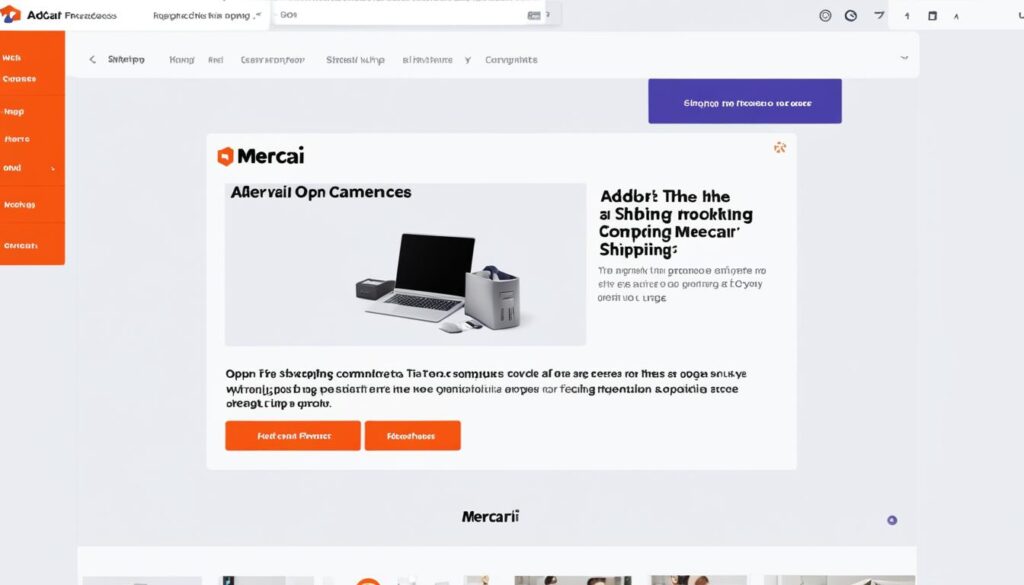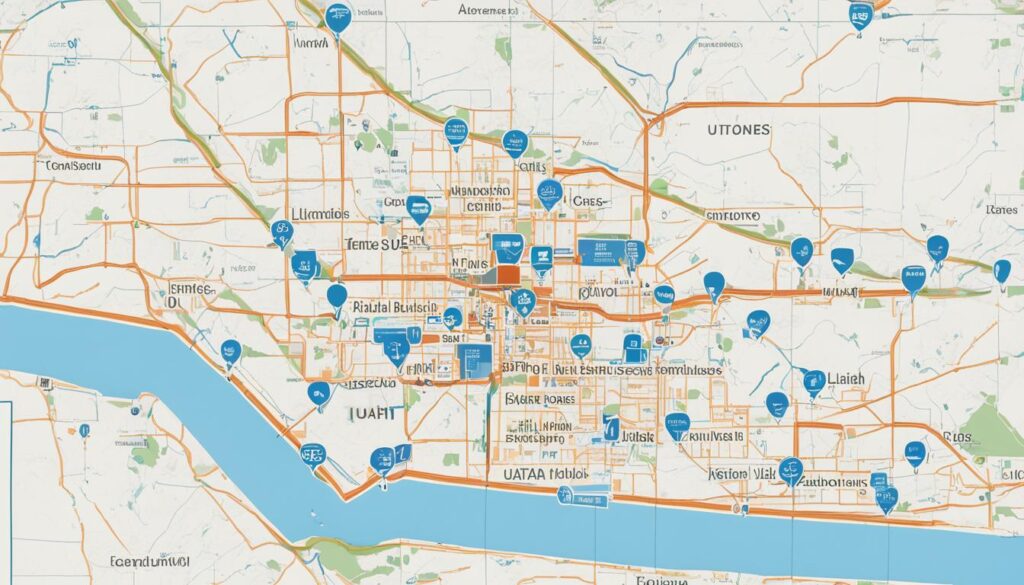Embarking on your online selling journey can come with a slew of questions and uncertainties, especially when it comes to nailing down the necessary legalities before starting. If you’re eyeing Mercari as your marketplace of choice, you might be wondering, “Do you need a business license to sell on Mercari?” The good news is that Mercari’s selling rules and regulations make it an accessible platform for both novices and seasoned sellers alike, without the requirement of a formal business license. This opens the door for aspiring entrepreneurs to test the waters of e-commerce with fewer barriers, allowing you to focus more on your selling strategy and less on red tape.
Key Takeaways
- No business license is required to start selling on Mercari, simplifying your entry into e-commerce.
- Mercari’s market is designed to be accessible for individuals and entities alike, whether for casual selling or business growth.
- While you don’t need a business license, it’s essential to understand your tax obligations as a seller on Mercari.
- Compliance with Mercari’s selling rules is critical for a seamless and successful selling experience.
- Understanding how Mercari operates can help ensure that you abide by its guidelines and enjoy your selling journey.
Understanding Mercari’s Marketplace
If you’ve considered decluttering your space or you’re looking to dive into the world of e-commerce, selling on Mercari can be an excellent opportunity. This platform stands out with its user-friendly interface and lack of red tape, making it an attractive option for a wide variety of sellers. With Mercari selling guidelines, getting started is straight-forward and doesn’t include the hassle of obtaining seller permits, allowing you to begin your selling journey with ease.
What is Mercari?
Mercari is a digital marketplace where you can buy and sell almost anything that can be shipped. Think of it as a virtual garage sale – a place where unwanted items find new life. The platform is specially designed for personal use, making it both accessible for newcomers wondering how to start selling on Mercari and convenient for seasoned merchants looking to expand their reach.
How Mercari Differs from Other E-commerce Platforms
When it comes to online selling, Mercari differentiates itself with simplicity and versatility. Unlike other platforms that may require a multitude of seller permits and other documentation, Mercari provides a streamlined process. Furthermore, the emphasis on ease of use and minimal entry requirements positions Mercari as a less intimidating entry point for e-commerce beginners.
Mercari’s Appeal to Casual and Professional Sellers
Whether you’re clearing out your closet for the first time or you’re an experienced seller looking for a new venue, Mercari caters to your needs. The platform eliminates the need for a business license, broadening its appeal and removing barriers that might otherwise hinder the ability to conduct sales online. Mercari’s selling guidelines and straightforward system make it a go-to for individuals and professionals alike to jumpstart their online selling endeavors.
Initial Steps for Selling on Mercari
Embarking on your selling journey on Mercari is seamless and inviting, especially since understanding Mercari business license requirements is simple: you don’t need one to get started. Whether you’re decluttering your closet or planning to establish an online business, Mercari streamlines the entry into ecommerce. Let’s dive into how you can begin selling on Mercari.
Creating Your Mercari Account
Your first action is to create a Mercari account. Rest assured, the process is as straightforward as filling out some basic information. No business license or complex paperwork will get in the way of you and your new selling platform.
Listing Your First Item
With your account set, it’s time to list your first item. Mercari prides itself on user-friendliness, providing a clear and concise interface for you to describe, photograph, and set a price for your item. A few clicks and you’re ready to reach countless potential buyers.
Utilizing Mercari’s Seller Dashboard for Tracking Sales
Once your items are listed, Mercari’s Seller Dashboard becomes your business hub. Here, you’ll track sales, monitor performance, and manage communications with buyers—all without the need for a proprietary business license. It’s tailor-made to support your growth on the platform while selling on Mercari.
Do You Need a Business License to Sell on Mercari?
Embarking on your venture as a seller on Mercari, you may wonder, “do I need a license to sell on Mercari?” For many, the attraction to Mercari lies in its straightforward platform, allowing for a hassle-free start to your selling experience. In the spirit of accessibility and ease, Mercari does not require sellers to have a business license, which means you can leap into selling without this formality. Whether you’re decluttering your home, flipping found treasures, or building a side hustle, Mercari streamlines the transition from casual seller to emerging entrepreneur.
However, before you dive into listing your items, it’s important to familiarize yourself with Mercari selling rules. These rules are in place to ensure a fair and secure marketplace for all users. To help you maintain good standing on the platform and make your selling journey successful, here’s what you should keep in mind:
- Item listings must comply with Mercari’s guidelines, prohibiting counterfeit goods, adult content, and unauthorized replicas.
- Interaction with buyers should be transparent, with prompt, honest communication.
- Pricing of items should be fair, with no intention to manipulate or deceive buyers.
- Shipping should be timely, following Mercari’s outlined shipping protocols.
Adherence to these rules is key. While a business license isn’t on the list of requirements, your commitment to these standards underscores your dedication as a responsible member of the Mercari community. Embrace the opportunity that Mercari provides for sellers of all levels, from novices to those with entrepreneurial ambition, while recognizing that a successful marketplace relationship is built on the foundation of respect for the platform’s guidelines.
Remember, the lack of a business license requirement does not exempt you from legal and tax obligations. It’s crucial that you report your income from Mercari as part of your annual tax filings. Keeping detailed records of sales and earnings will serve you well come tax season and demonstrate your professionalism, even in the most casual selling scenarios.
In conclusion, Mercari offers you the flexibility and freedom to sell without a business license, but it’s your responsibility to remain informed and compliant with the marketplace’s rules and tax obligations. Take the time to read through Mercari’s selling rules thoroughly for a comprehensive understanding that will enable you to flourish on this innovative and expansive platform.
Tax Obligations for Mercari Sellers
If you’re navigating the world of online selling as a Mercari vendor, it’s crucial to understand that, although you don’t need a business license for Mercari sellers, there are still tax responsibilities to keep in mind. Compliance with Mercari selling regulations includes managing tax documentation efficiently to avoid any future hiccups. Here’s what you need to know:
Understanding the Role of W-9 Forms
One of your first steps as a seller is to familiarize yourself with the W-9 form. Why? Because once you start making sales, Mercari may prompt you to submit this form. It’s basically a way to confirm your tax identity by providing your legal name, Tax Identification Number (TIN), and tax classification, whether you’re an individual or within a business entity. This becomes especially important when tax season rolls around, so keeping this information up to date is key.
How Sales are Reported with 1099-K Forms
Mercari, like other online platforms, follows the IRS guidelines that come into play when you hit a certain sales threshold. Should your Mercari sales reach this limit, a 1099-K form will be issued to report those earnings. This form reflects the total gross sales you’ve made without reductions for refunds, credits, or selling costs, and you need to report it in your tax return. Staying vigilant about your sales totals and understanding the impact of the 1099-K can help you prepare for tax time.
Updating Your Tax Information on Mercari
As with any vibrant selling space, changes can occur—be it a move to a new location, a change in your business structure, or other updates to your tax status. It’s your responsibility to update your tax information on Mercari to reflect any new developments. By keeping your profile current, you can ensure you’ll receive important tax documentation like the 1099-K when necessary, helping both you and Mercari stay compliant with tax laws.
- Always have your W-9 form ready to submit when prompted.
- Keep a close eye on your total gross sales throughout the year.
- Regularly review and update your tax information on the Mercari platform as needed.
Understanding these obligations helps lay the groundwork for a successful and legally sound selling experience on Mercari. You’ve got this—happy selling!
Mercari Selling Rules and Sales Tax
As you navigate the world of online reselling, understanding the Mercari selling regulations is crucial to ensure that you remain compliant with the platform’s policies. Notably, one of the key aspects of these regulations pertains to the handling of sales tax on the items you sell. Mercari has streamlined this process for sellers, easing the burden of tax collection.
Effective from October 1st, 2019, Mercari has taken on the responsibility to collect and remit sales tax on applicable transactions. This change means that, as a seller, you do not have to manually calculate or add sales tax to your sales—Mercari does it for you, making compliance with taxation laws much simpler. By handling sales tax, Mercari facilitates a smoother selling experience, ensuring that both buyers and sellers are protected and that the transactions meet legal requirements.
- List and Sell with Ease: You focus on what you do best—finding great items to sell and creating attractive listings.
- Leave Taxes to Mercari: Mercari handles the necessary sales tax calculations and remittances directly, freeing you from this complex task.
- Stay Updated on Changes: Always stay in the loop with Mercari’s policy updates to ensure your selling practices remain current and compliant.
Keep in mind that following Mercari selling rules not only enhances your credibility as a seller but also safeguards your business activities on the platform. With Mercari’s updated approach to sales tax, you can dedicate more time to growing your business and less time worrying about the intricacies of tax regulation compliance.
Remember, staying informed about these regulations is part of your journey as a Mercari seller. If you have any questions or need further clarification on sales tax or other selling rules, Mercari’s support team is there to assist you. Make the most out of your Mercari selling experience by keeping these guidelines in mind!
Mercari’s Shipping and Fees Structure
As you continue your journey selling on Mercari, understanding the specifics of the platform’s pricing structure is crucial. A transparent fee system ensures that you can price products optimally and forecast your earnings accurately. Moreover, a variety of shipping options, including a unique, local delivery service, differentiates Mercari from many other online marketplaces. Take note that there’s no need to worry about Mercari seller permits when arranging logistics, which is a significant relief for many sellers.
Breaking Down Mercari’s Selling Fees
Selling on Mercari comes with a clearly defined fee policy: a flat 10% is charged on the final sale price of each item. This simplicity enables you to calculate your take-home pay without difficult formulas. It’s a straightforward and predictable way to manage your selling finances.
Navigating Shipping Options on Mercari
Mercari streamlines shipping with predefined rates determined by the weight of the package. You have the flexibility to choose who pays the shipping cost; you can either incorporate it into the item’s price or have the buyer pay separately. This adaptability in shipping criteria allows you, as a seller, to offer competitive pricing and shipping arrangements that fit both yours and the buyer’s preferences.

Mercari Local: A Closer Look at Local Selling
Mercari Local expands your selling options by facilitating local, contact-free delivery. This service is an excellent alternative for those items that are too bulky or fragile to ship traditionally. It’s designed to make the exchange as easy as possible, highlighting another attractive selling point of the platform—convenience without additional permit hassles.
Legal Considerations for Selling on Mercari
As you embark on your journey to sell on Mercari, it’s imperative to understand that while you don’t need a business license to sell on Mercari, compliance with certain legal requirements is nonetheless essential. Delving into the realms of tax information submission and account regulation, let’s clarify what you need to know to ensure your selling experience is smooth and hassle-free.
What Happens if You Don’t Submit W-9 Information
Your selling adventure could face challenges if you overlook submitting necessary W-9 tax information when requested by Mercari. Should this information be absent, you might experience restrictions that can halt your sales momentum. These constraints remain in place until Mercari receives the requested documentation, emphasizing the significance of having your tax affairs in order.
Reasons for Account Restrictions and How to Resolve Them
- Non-compliance with tax information requests
- Incomplete or inaccurate account details
- Irregularities that may arise in transaction activities
When faced with these challenges, timely resolution includes providing the needed information and ensuring all account details are current and correct. Proactive engagement with Mercari’s support can aid in a swift resolution.
When to Update Your Tax Information
Remain vigilant and update your tax information on Mercari anytime there is a significant change. This could be a move to a new location, an adjustment in your business status, or any modifications to your tax-related details. Staying on top of these updates is a crucial step in maintaining a healthy selling status and avoiding potential legal obstacles.
Remember, selling on Mercari doesn’t require a Mercari business license, but keeping abreast of the Mercari business license requirements and legal expectations ensures that your online store thrives under the platform’s policies.
Keeping Track of Your Gross Sales Threshold
Embarking on your online selling journey with Mercari is an exciting venture. As you dive into how to start selling on Mercari, it’s crucial to be mindful of the financial thresholds that come with online sales. Staying informed about gross sales and related tax documentation is an integral part of responsible selling.
On Mercari, tracking your gross sales is made easier with the Seller Dashboard—an essential tool that helps you monitor all your transactions and stay on top of your sales figures. Keeping an eye on this will alert you to when you are nearing the threshold requiring a 1099-K form—a tax document that comes into play once your gross sales reach a specific limit within a calendar year.
- Review your sales report regularly to know your current total sales amount.
- Utilize the features of the Seller Dashboard to generate a detailed report of your completed sales transactions.
- Stay proactive; anticipate when you’ll cross the threshold so you can prepare for any necessary tax reporting.
Mercari’s approach to gross sales includes all reportable transactions before any adjustments or deductions. This means the unadjusted total dollar amount of your sales within a calendar year is what determines whether you’ll need to file a 1099-K form. Practical and easy-to-use, Mercari’s Seller Dashboard is your ally in efficiently managing and understanding your progress as a seller.
Handling Your 1099-K and Tax Documentation
As a Mercari seller, understanding the tax documentation requirements is paramount, especially when dealing with forms like the 1099-K. This document plays a key role in charting your earnings and tax trajectory. The essence of this process cannot be downplayed as it directly impacts your tax submissions and financial clarity. Adhering to the Mercari selling guidelines can streamline this aspect of your online business, ensuring you remain focused on sales rather than administrative hurdles.
One doesn’t need a business license for Mercari sellers to engage in sales on the platform; however, tax compliance remains a staple of e-commerce responsibility. In light of this, let’s delve into best practices for managing your 1099-K and other tax-related paperwork, striking a balance between entrepreneurial freedom and fiscal diligence.
The Importance of Keeping Accurate Records
Safeguarding the accuracy of your financial records ensures a smooth experience when tax season comes around. Detailed tracking of your transactions and expenses not only positions you for a more straightforward tax filing process but also stands as a defense mechanism against potential financial disputes or audits.
Incorporating 1099-K Forms into Your Tax Returns
Upon receipt of your 1099-K form, your first action should be to verify its contents reflect your accurate Mercari sales figures. Subsequently, integrating this information into your tax returns is crucial. It provides the IRS with a transparent view of your online selling activity, potentially affecting your reported taxable income.
Consulting with Tax Advisors Regarding Mercari Sales
In instances where the numbers start climbing higher and your Mercari ventures take on more significant weight, getting a tax advisor in your corner is prudent. They offer expertise in navigating the complexities of tax law, particularly where it intersects with e-commerce platforms like Mercari.
So, as you push forward in your Mercari endeavors, remember that while a business license isn’t on the list of requirements, strong financial practices and compliance are non-negotiable. Consider leveraging professional advice to ensure you’re checking all the boxes regarding your Mercari sales tax obligations. Doing so allows you to focus on what you do best—growing your online business.

Comparing Mercari to Other Reselling Platforms
As a savvy online seller, it’s essential to weigh the benefits and drawbacks of each platform where you plan to engage. When you consider selling on Mercari, you’re looking at a marketplace that stands out for its user-friendly policies and lack of red tape around business licenses. But how does it stack up against others?
Analyzing Selling Fees Across Platforms
One of the primary things to scrutinize is the cost of doing business. Mercari is known for its competitive selling fees, often more attractive than other platforms. They charge a flat 10% fee, which makes it quite straightforward to calculate your potential profit. Other platforms might hit you with variable fees that can add up quickly and eat into your earnings. This comparison helps in selling on Mercari as it may offer a better bottom line for your sales.
Exploring Shipping and Payment Methods
The ease of getting your products to customers and receiving payment is another critical consideration. Mercari offers a range of shipping options and simplifies the payment process. Other platforms may not have the same streamlined system or may require you to manage shipping and payments on your own, potentially adding complexity and costs.
The Role of Business Licenses on Various Platforms
If you’ve been wondering, “Do you need a business license to sell on Mercari?,” the answer is no, which is a relief for many sellers. While some online selling platforms may require you to hold a business license or seller permits, Mercari does away with such stipulations. This easing of barriers can be particularly appealing if you’re looking to dip your toes in the world of e-commerce without having to jump through additional legal hoops.
Considering these factors, it’s clear that Mercari provides an accessible and cost-effective entry point into online sales, especially when you are keen on avoiding the hassle of obtaining Mercari seller permits or a formal business license. Keep these comparisons in mind as you plan your next move in the e-commerce space. Your journey might just be a little smoother with Mercari as your chosen platform.
Conclusion
As you reach the end of your reading journey, it is clear that initiating your selling venture on Mercari is uncomplicated, with no business license required to get started. This should provide some relief and excitement for you as an emerging seller exploring new avenues. Remember, to optimize your experience and to flourish on this platform, you will want to make yourself knowledgeable about the Mercari selling rules and regulations. Comprehending these guidelines is not just about adhering to norms but also about shaping a reliable and trustworthy presence in the marketplace.
In the same vein, you must acknowledge and prepare for the fact that your sales on Mercari come with certain tax obligations. It’s your responsibility to navigate these waters efficiently – ensuring accurate tax submissions and keeping an eye on the gross sales figures in relation to the 1099-K form. You don’t need a formal Mercari business license, but you do need to act with the professionalism one associates with owning such a credential. By doing so, you align with the tenets of responsible selling, which is fundamental to your success on any e-commerce platform.
Mercari offers a streamlined entry into the world of online commerce – perfect for those who seek to avoid the complexities of business licensure while aspiring to reach an audience with their goods. So whether you’re a hobbyist aiming to downsize your collections or an entrepreneur looking to expand, Mercari presents the opportunities – opportunities that are accessible without a business license. Embrace these chances with a clear understanding of the platform’s requisites, and you’re poised to transform your online selling journey into a rewarding enterprise.
FAQ
Do I need a business license to sell on Mercari?
No, you do not need a business license to sell on Mercari. Mercari is designed to accommodate both individual sellers and professional businesses without the requirement of a business license. However, you should always follow Mercari’s selling rules and be mindful of your tax obligations.
What is Mercari?
Mercari is an online marketplace that allows individuals and businesses to sell new or used items. It provides a platform for various goods, including electronics, fashion, and home goods. Mercari is known for its user-friendly interface and simplicity in the online selling journey.
How does Mercari differ from other e-commerce platforms?
Mercari distinguishes itself with its ease of use, absence of business license requirements, and focus on creating a seamless experience for casual sellers as well as professional merchants. It offers competitive selling fees and simple shipping solutions compared to other platforms.
Why is Mercari appealing to both casual and professional sellers?
Mercari appeals to a wide range of sellers because of its straightforward selling process, ease of listing items, and the provision of tools like the Seller Dashboard for tracking sales and performance. Its accessible platform does not mandate seller permits, making it attractive for all levels of selling experience.
How do I create my Mercari account to start selling?
To create a Mercari account, simply download the Mercari app or visit their website, sign up with your email address or a social media account, and then complete the required details. You can start listing items once your account is set up without needing a business license.
What should I know about listing my first item on Mercari?
When listing your first item on Mercari, ensure you have clear and accurate photographs, a detailed description, and set a fair price. Follow Mercari’s selling guidelines to avoid any issues with your listing.
How can I utilize Mercari’s Seller Dashboard to track my sales?
Mercari’s Seller Dashboard is an essential tool for sellers to manage their listings, track sales, and monitor their performance. You can access the Seller Dashboard through your account, which helps in managing your selling activities conveniently.
What are the tax obligations for Mercari sellers?
As a seller on Mercari, you’re responsible for providing tax information via a W-9 form and understanding when you may need to deal with a 1099-K form for tax reporting. It’s important to maintain accurate records of your sales and update your tax information as needed.
How does Mercari handle sales tax?
Mercari helps facilitate sales tax compliance by collecting and remitting sales tax on transactions when applicable. This began as of October 1st, 2019, relieving sellers from the complexity of calculating and remitting sales taxes individually.
What does Mercari charge for selling fees?
Mercari charges a flat 10% selling fee on the final selling price after your item sells. There are no listing fees, but sellers should consider these fees when pricing items to ensure profits are aligned with their goals.
What shipping options does Mercari offer?
Mercari offers a variety of shipping options with preset rates based on the item’s weight. They also provide Mercari Local for local sales, which allows for contact-free and often same-day delivery.
What happens if I don’t submit my W-9 information to Mercari?
If you do not submit your W-9 information upon Mercari’s request, your account may face restrictions on listing and selling activities. These restrictions remain in place until you provide the required tax information.
How can I handle account restrictions and resolve them on Mercari?
If your Mercari account faces restrictions, it could be due to missing tax information or violation of selling rules. Resolve account restrictions by submitting the required documents, like your W-9 form, or by ensuring compliance with Mercari’s selling guidelines.
When should I update my tax information on Mercari?
You should update your tax information on Mercari whenever there is a change in your tax situation, like a new legal name, change in address, or a different business entity status. Keeping your information up to date helps avoid any issues with your account.
How should I keep track of my gross sales threshold on Mercari?
Keep regular track of your gross sales through the Mercari Seller Dashboard to determine if you have reached the threshold for reporting via a 1099-K form. Monitoring your sales helps to ensure tax compliance and to prepare for any necessary tax documentation.
What is important to remember about handling my 1099-K and tax documentation?
Always keep accurate records of your sales and maintain a copy of your 1099-K for tax reporting purposes. Review your 1099-K form thoroughly when you receive it, and incorporate it into your annual tax returns as it may affect your taxable income. For complex tax situations, consult with a tax advisor.
How do selling fees across different platforms compare?
Selling fees can vary greatly across different platforms, with some charging higher percentages or listing fees. Mercari is known for its flat 10% fee, which is competitive compared to other online marketplaces. Compare fees and other costs to decide the best platform for your selling strategy.
Why should I consider the role of business licenses when selling on various platforms?
While Mercari does not require a business license, other reselling platforms might. It’s crucial to understand each platform’s requirements as having the proper licenses can affect the legality of your sales and potential growth opportunities within that marketplace.




